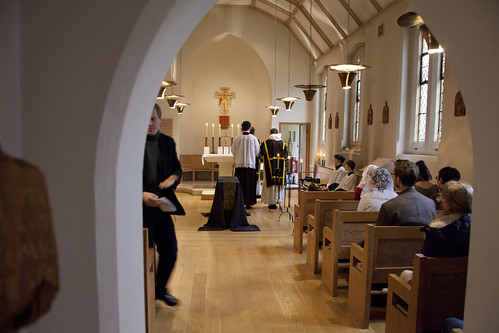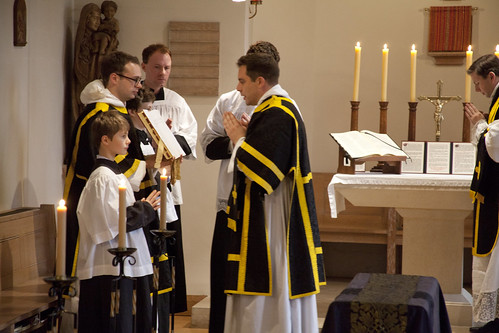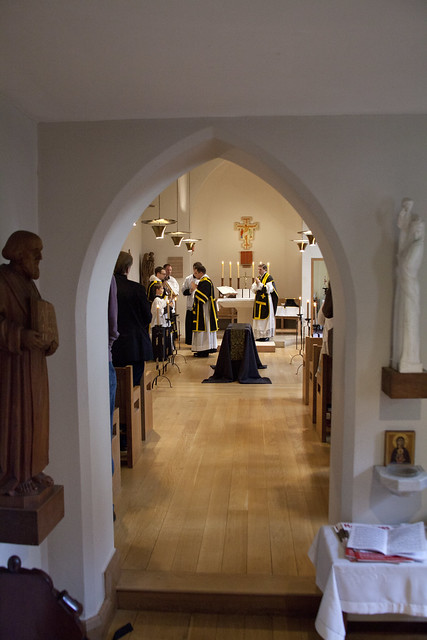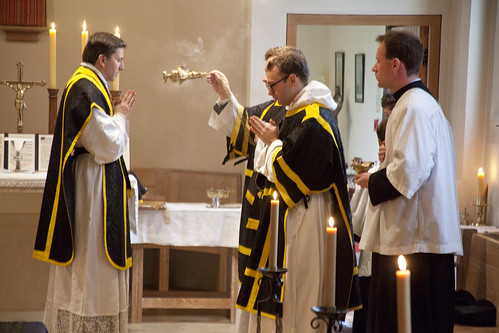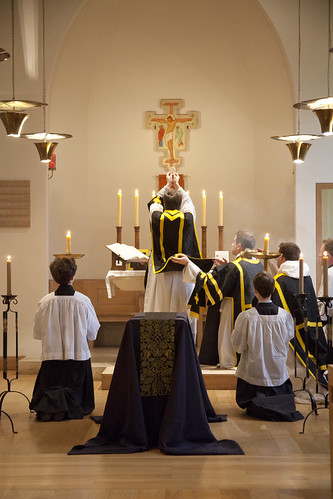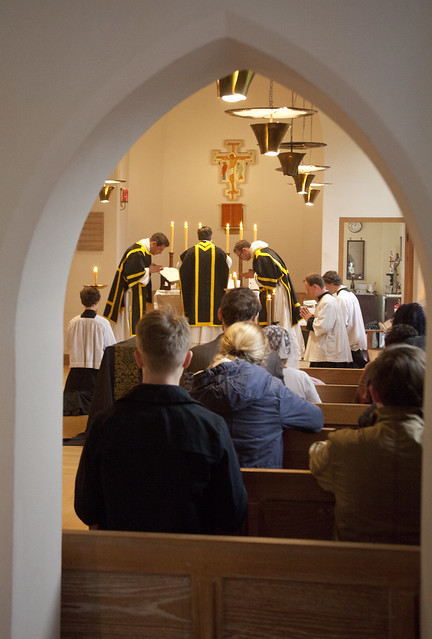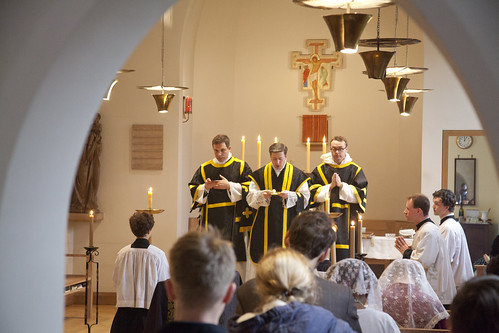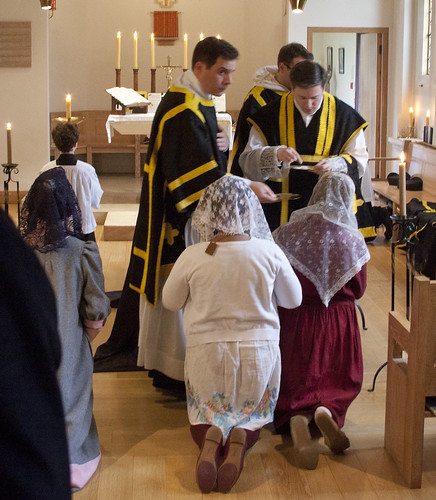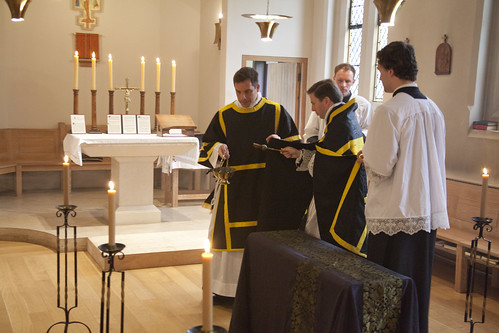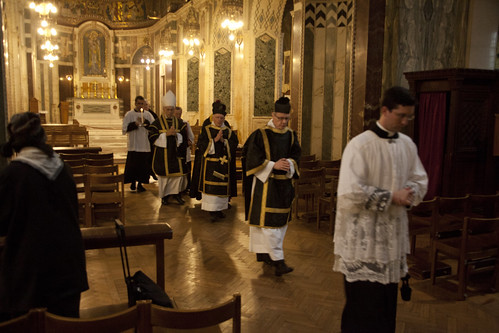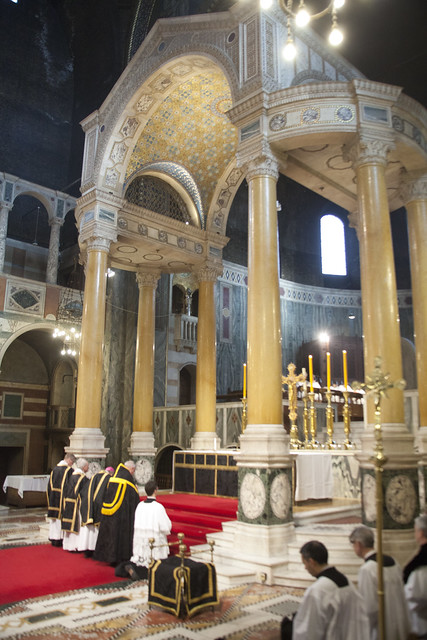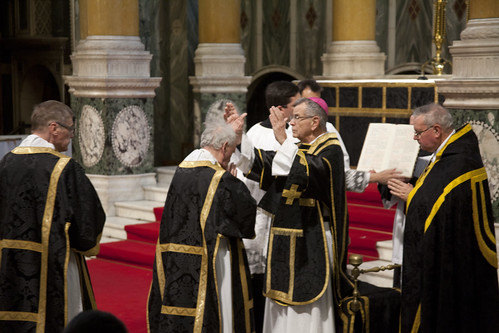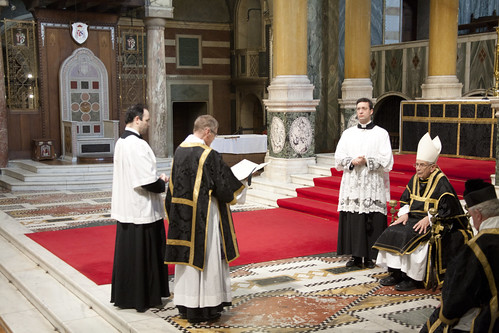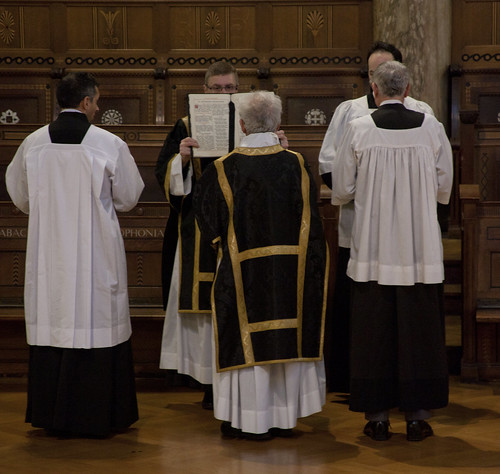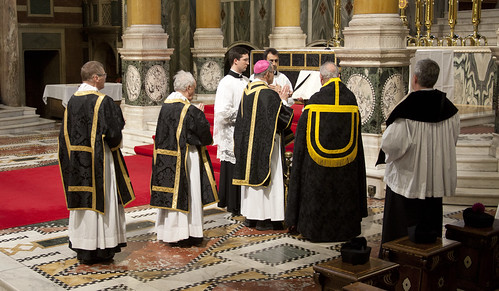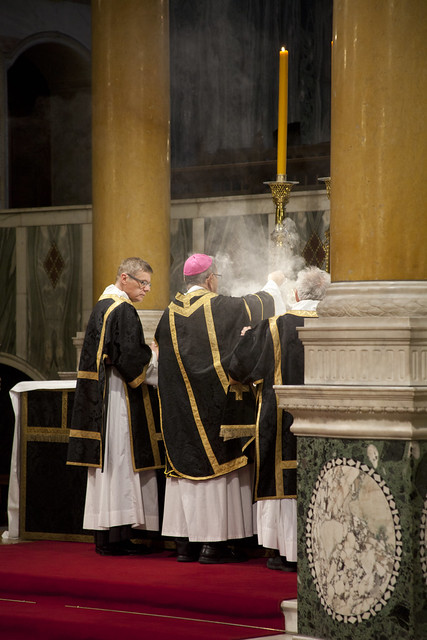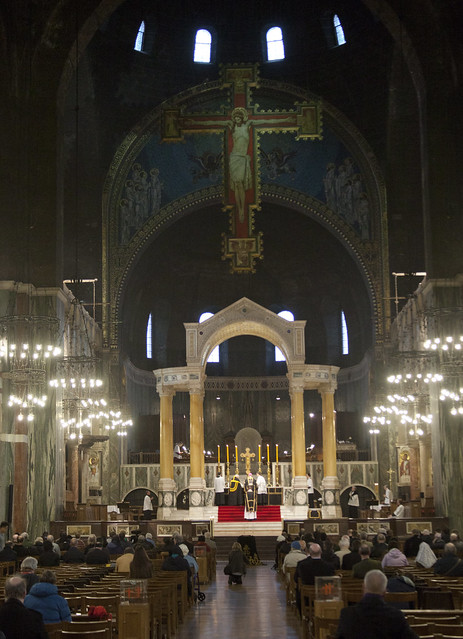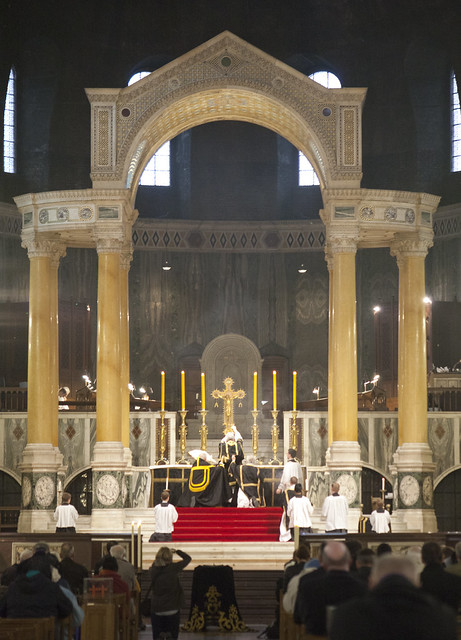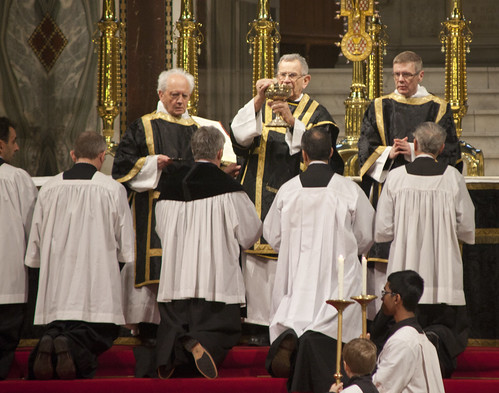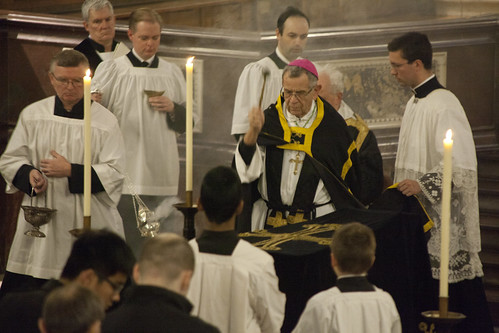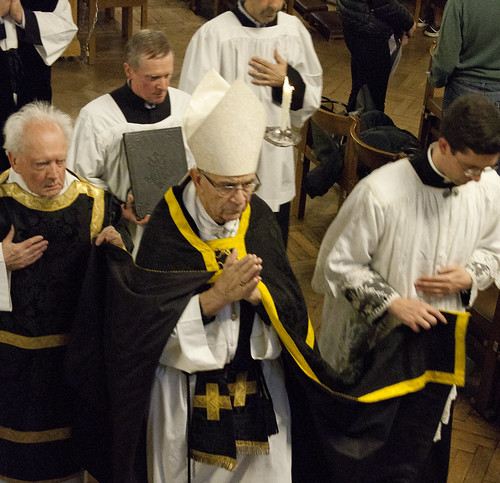Chairman's Blog
Photos of St Benet's Requiem
The annual Traditional Requiem, sponsored by the Latin Mass Society, took place yesterday; here are some photographs.
Celebrated by Fr Edward van den Burgh of the London Oratory, assisted by Fr Nicholas Edmunds-Smith of the Oxford Oratory and Br Albert Robertson OP.
Mass was accompanied by the Schola Abelis of Oxford under Dominic Bevan.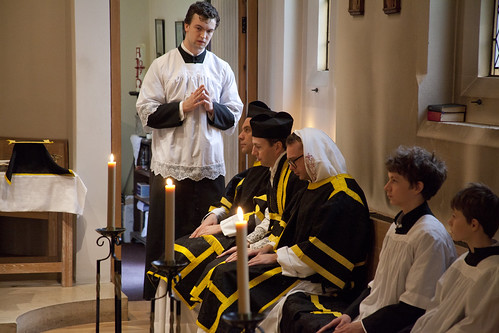
I am very grateful to Fr John Saward of SS Gregory & Augustine's for the loan of the candlesticks and other items used in the Requiem.
'Not in the hands of boys, but in their eyes,
Shall shine the holy glimmer of goodbyes.' (Wilfrid Owen.)
No candles at the Gospel: the acolytes stand by the deacon singing the Gospel, but without their candles.
This isn't the first time I've managed to organise a High Mass for this occasion, though most of these, since I started them in 2013, have been Sung Masses without deacon and subdeacon. With the catafalque, there is not an abundance of space, but it is possible.
I organise Masses in a number of rather small churches and chapels, and the small catafalque (which is a console table the rest of the time), with the pall which covers it exactly, has been in many of them. The rather small thurible I also aquired with such chapels in view, which tend to be the ones without thuribles of their own.
In St Benet's there is an additional difficulty of celebrating ad orientem with the altar close to the edge of the step. The footpace used yesterday is a wooden platform made specially for this purpose.
The capacity of the chapel is extremely limited, but a decent crowd came along.
May the deceaed alumni, staff, and benefactors of the Hall rest in peace.
Support the work of the LMS by becoming an 'Anniversary Supporter'.
The New Age and the Old Mass
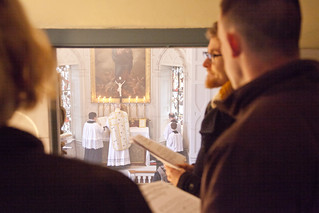 |
| Milton Manor House, Oxfordshire |
Today I am publishing a new Position Paper from the FIUV on the New Age. Go over to Rorate Caeli to read it. Here I present some background and further reflections.
A few years ago on the LMS Walking Pilgrimage to Walsingham I noticed that four of my fellow pilgrims were converts to the Catholic faith from Buddhism. Buddhism is not a major religion in the UK, so the coincidence was rather remarkable. Indeed, in a number of obvious ways Buddhism presents a very marked contrast to Catholicism, and traffic between Buddhism and Catholicism tends to flow the other way. In fact, three out of these four pilgrims had been Western converts to Buddhism, before they came to the Catholic Church.
Buddhism in the West is part of a wider phenomenon, of the attraction posed by eastern spirituality to post-Christin or nominally Christian westerners. This eastern spirituality is often somewhat re-packaged for western tastes, and only the most serious-minded go the whole hog and become Buddhists. Far more popular are the (apparently) nice bits of eastern spirituality, such as reincarnation and the idea of self-realisation, without the asceticism and the infinitessimal prospects of success. Add these to a bit of Tarot-reading, Astrology, the 'all-religions-are-one' dogma of Freemasonry, and other bits of Western-inspired clap-trap, and you have the New Age Movement. This soup of influences is united by the idea that we can free ourselves from soul-cramping restrictions imposed by bad upbring, traditions, and habits, by spiritual techniques, such as meditation, perhaps aided by Yoga, or maybe even drugs.
It is easy to make it sound silly, but it is ubiquitous. We no longer live in a Christian society, but that does not mean there is no spiritual narrative guiding people's lives. Instead of seeking salvation and transformation by Christ, a high proportion of the other people on you local bus would probably agree that they are ultimately concerned with gaining self-realisation through techniques: as the New Agers say, by 'working on themselves'. It may be positive thinking, it may be the gym, it may be a new diet. But it is spiritual, in the sense that it concerns what is most central to them, and what, if anything, has transcendent value. Of course they may not use these terms, but we can determine that we are not simply dealing with material ambition, whether healthy or pathological, because it is about making themselves not just better off, but better people. In this sense, it has replaced religion in their lives - even if some of them still pop in to church occasionally.
Not all of the people on the bus who think about the kind of person they want to be can, in the end, work up the energy to give up red meat, take up Yoga, lose two stone, or whatever it is they think might help. It remains true, however, that, instead of seeking salvation from Christ, they are seeking, well or badly, self-realisation through techniques. If they are to convert to Catholicism, they will need to give up the idea that their ultimately important destiny is some vision of self-perfection. They will have got to accept, what they or their parents or grandparents rejected, the Christian narrative of sin, grace, and redemption, an external and personal God, and an eternal heaven and hell.
The New Age spiritual narrative, as I have described it, has replaced the Christan one for most of the population of the English-speaking world since the 1960s. Even if the hard-core, self-identified, tofu-eating, sandal-wearing, New Agers are relatively few, in this more general sense their ideas have won.
It is a matter of no small interest, then, why they have won, and how this victory can be reversed. I was able to consult a good number of Traditional Catholics who had spent time in the the New Age and Occult milieu, to help with the development of this Position Paper. Thus is not just armchair theorising: it is informed by first-hand experience.
So here in a nutshell is the argument of the paper. If the New Age spiritual narrative won, it must have been more attractive than the alternatives apparently available. The New Age is, among other things, a revolt against rationalism and moralism, and a search for the mysterious and transformative. The major alternative in the English-speaking world in the 1970s was a Protestantism which has ceased to believe in itself, and had never been very good at offering its adherents transformative mystery, in liturgy and spirituality. Catholicism, which had been good at doing that, quite suddenly stopped doing it, just at the moment the New Age was gaining momentum.
Here's the pitch. You're not being offered anything impressive or exciting by conventional religion? You are feeling a bit depressed and a bit uptight? Use these techniques to unlock your inner potential because, yes, you are a wonderful person, if only you knew it, and you just have to free yourself.
Those who do try the techniques can feel a bit buzzy and euphoric, and when that wears off there are more, stronger, techniques to try. Some of them contain perfectly genuine benefits, to health for example. Some are very dangerous. But you'll be dead long before you've tried them all.
The Church can't combat this by offering some watered-down New Ageism. It can offer the profound in place of the superficial, the objective in place of the subjective, and the real in place of the fake. It can offer a transcending mystery which really can heal and transform. It can open the door the New Ager is knocking on. The traditional liturgy is the ideal means to do this.
Click on the label 'New Age' to see other things I written here about it.
Support the work of the LMS by becoming an 'Anniversary Supporter'.
Bishop Li in
 |
| Bishop Li in 2013 |
Bp. Joseph Li Side, an 'underground' bishop consectrated secretly, died this morning (11:20pm GMT), aged 97. Please pray for him.
Bp. Li was a pillar of traditionalism, as well as of true fidelity to the See, in the Chinese speaking Church.
In his nineties he translated the 1962 missal into Chinese, to aid Chinese speaking clergy in the understanding of the prayers. This massive project will continue to be of great significance for Chinese Catholics far into the future.
On a more personal level, he and some of the priests in his diocese gave the old mass movement much support.
The Novus Ordo Missae was not introduced into China until the 1980s, so there remains a generation of priests who were taught the the ancient Mass in seminary. See the FIUV Position Paper on the Extraordinary Form and China.
There is a little more about him and his activities in this UCA News report.
Support the work of the LMS by becoming an 'Anniversary Supporter'.
Annual Requiem in St Benet's Hall, Oxford
Support the work of the LMS by becoming an 'Anniversary Supporter'.
Priest Training Conference, Low Week 2018
The LMS Priest Training Conference is back! It didn't happen last year because of the late Easter (Low Week was in term time at our venue, Prior Park).

Tuition will be in small groups. For clergy and seminarians, this will be provided by priests experienced in the Extraordinary Form, for servers this will be provided by laymen with years of experience in the Extraordinary Form.
 The conference will start after lunch on the Monday and conclude before lunch on the Thursday.
The conference will start after lunch on the Monday and conclude before lunch on the Thursday.Full-time students: £60
Seminarians: FREE OF CHARGE
Support the work of the LMS by becoming an 'Anniversary Supporter'.
Autumn Mass of Ages now available
In this issue:
• Bishop Michael Campbell OSA, Bishop of Lancaster, leads us in to the great liturgical seasons of Advent and Christmas with a thought-provoking meditation
Feature on St Augustine's, Ramsgate:
"Augustus Pugin is a name that should be on the lips of every Catholic in England... He became one of the most influential architects and designers of the nineteenth century, championing Catholicism and the Gothic style in everything…
"He said that building a church was the greatest thing a man can do, and that is precisely what he did in Ramsgate. For the greater glory of God, he created this ideal church where God could be worshipped according to the ancient rites of our Holy Mother the Church.”
St Augustine's was the home of The Victoria Consort. Recorded in the Shrine, their CD traces, in Gregorian Chant, the arrival of St Augustine in Kent and the re-establishment of Christianity in England from AD 596.
Feature on the Crib:
"...no Catholic family home is complete, at Christmas, without a Crib: a three-dimensional representation of the Stable at Bethlehem, with its inhabitants” writes Joseph Shaw. “The history of the Crib is an interesting one. It is clearly a cousin of the Medieval Mystery Play, another way of representing and making vivid key scenes from Scripture, which embedded them in the late Medieval Catholic imagination… The crib is a visual Gospel [a point made by Bishop Campbell in his meditiation] and its place in churches is entirely appropriate, as well as in private homes.”
Nativity scenes for your home are available from the LMS online shop.
Book review: Una Voce: The History of the Foederatio Internationalis Una Voce 1964-2003
“Leo Darroch’s important book contains valuable insights into every major development in the treatment of the Traditional Mass over the long period of time it covers, and makes clear the important role of the FIUV. It will be an indispensable work of reference for scholars and historians,
as well as being of interest to anyone who wants to become well informed about the treatment of our liturgical patrimony during its long time in the wilderness.”
Leo Darroch was a member of the LMS Committee from 1986 until 2012; Deputy Chairman to Christopher Inman, and converted the old-style A4 typed reports into a modern magazine style in the early 90s.
Read the full review in Mass of Ages. Better still, buy the book and read it for yourself!
Also included:
Shaun Bennett remembers the Rev. Dom Antony Tumelty OSB.
Matt Showering reports on Tolkein’s devotion to the Blessed Sacrament.
Clare Bowskill reports from the recent LMS Latin Course.
Alisa Kunitz Dick tells about her experiences of teaching Latin and Greek to children.
Our regular columnists:
• Alberto Carosa reports on the 6th Summorum Pontificum Pilgrimage to Rome
• See photographs of our own celebration for the 10th anniversary of Summorum Pontificum
• In her Art and Devotion series, Caroline Shaw looks at The Nativity by Piero Della Francesca
• Mary O’Regan on the significance of the number 13
• Fr Bede Row asks, “Do we still believe in the Devil?”
• The Lone Veiler on ‘The war against women’
Thanks to the cooperation of priests in whose parishes the Traditional Mass is celebrated, Mass of Ages is available from more than 115 cathedrals and churches around the country. If you do not live near one of these but would like a copy of the magazine, we would be very happy to send one from the LMS Office. However, due to the high cost of postage, we do ask that you cover the cost of postage. See here for details.
To help the Latin Mass Society continue its work of promoting and developing Traditional Catholic life and practice in the Church, please consider signing up to our Anniversary Supporters’ Appeal.
A digital copy of the magazine may be read HERE(link is external).
Thanks to the cooperation of priests in whose parishes the Traditional Mass is celebrated, Mass of Ages is available from more than 115 cathedrals and churches around the country. If you do not live near one of these but would like a copy of the magazine, we would be very happy to send one from the LMS Office. However, due to the high cost of postage, we do ask that you cover the cost of postage. See here for details.
Developments at Holy Trinity, Hethe, and Spetchley Park
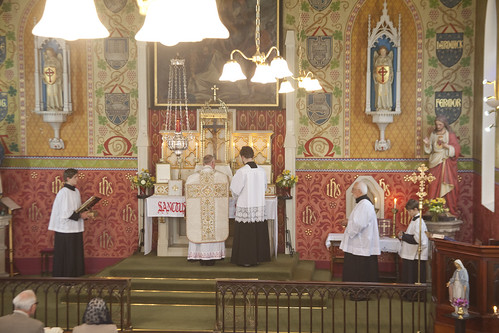 |
| The highly decorated interior of Holy Trinity, Hethe. |
This Sunday, 12th November and Remembrance Sunday, will see Fr Anthony Talbot's last Mass in the Chapel of St John the Baptist, Spetchley Park.
After a short break, however, he will celebrate his first Sunday Mass in Holy Trinity, Hethe, near Bicester, on Sunday 2nd December.
Fr Talbot will be missed in Spetchley, but welcomed in Hethe! This will bring to an end the current situation of a rota of priests serving this Sunday Mass, at 12 noon, which was established three years ago by the Parish Priest Fr Paul Lester. These Masses are sung on the 2nd and 4th Sundays of the month.
Support the work of the LMS by becoming an 'Anniversary Supporter'.
LMS Annual Requiem in Westminster Cathedral: Pictures
Celebrated by Bishop Mark Jabalé, assisted by Mgr Gordon Reid (AP), Fr Patrick Hayward (deacon), Fr Mark Elliot Smith (subdeacon), and Canon Vianney Poucin de Wouilt (1st MC).
It was accompanied by singers of the Cathedral Choir with chant.
Support the work of the LMS by becoming an 'Anniversary Supporter'.
Correctio Filialis: it's not going away
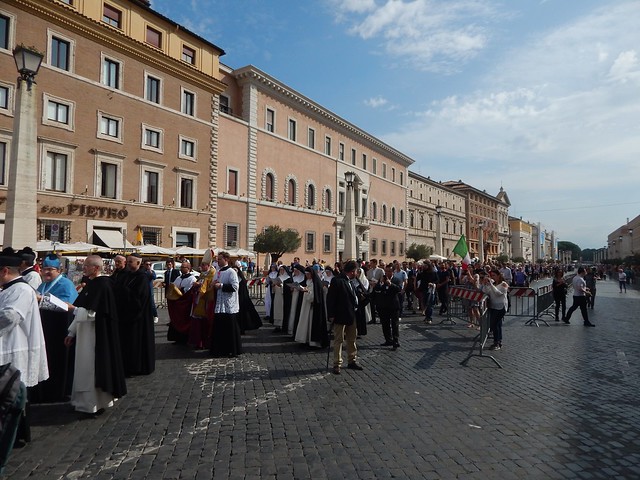 |
| The traddies on the march: the Summorum Pontificum Pilgrimage in Rome marking the 10th anniversary of Summorum Pontificum. It turns out this is just the vanguard. |
Hard on the heels of the distinguished theologian Fr Thomas Weinandy publishing a letter to Pope Francis strongly criticising his government of the Church, Dr. Gregory Popcak has published a remarkable article on the Patheos site, calling for critics of those who say they are 'confused' by Amoris laetitia Ch 8 need to 'repent' of grossly patronising clericalism.
Not all readers may understand the significance of this, so allow me to fill in the background. Dr Popcak, as he explains in the article, is not only a 'pastoral counsellor', but is head of a major centre of pastoral counselling, and trains pastoral counsellors. The Church in the United States has the resources (and of course the needs) to maintain an entire industry of pastoral counselling. Maybe I'm too English, or too traditional (I'd rather talk to a priest), but this kind of thing isn't really my kind of thing. But that's just the point. This industry of pastoral counselling going on over the pond has got absolutely nothing to do with an interest in the Traditional Mass, which some people are now trying to suggest is the common factor in opposition to liberal interpretations of Amoris laetitia. Well, they couldn't be more wrong. This guy is from the centre of the 'conservative', Pope St John Paul II-focused, mainstream, establishment Catholic world, and the Patheos platform, which has hosted a good many attacks on traditional Catholics over the years, is this world's in-house magazine.
Charles Collins, writing in Crux, wanted to play down the significance of the Filial Correction, observing (with some justice) that its language and signatories lean towards the traditionalist end of the spectrum of opinion. He continues:
Instead of presenting a unified front to the pope, the filial correction has highlighted the differences among conservatives in the Church under Francis.
Not just between the Weinandys and the Shaws, but also the numerous conservative Catholics who are confident Amoris Laetitia should be read in a way that doesn’t change the Church’s practice on sexual ethics and position on communion for the divorce-and-remarried.
But this is where he is wrong. The purpose of the Filial Correction wasn't to garner support for the Filial Correction. The purpose was to raise the level of debate about Amoris laetitia and to encourage those with misgivings about the liberal interpretation of Amoris to come forward. In this it has been staggeringly successful. Perhaps it is a coincidence, but the 'Overton Window' of criticisms of the policies and (apparent) personal attitudes of a reigning Pope seems to me to have shifted more in a couple of months than it had in the previous century and a half. Whereas on the eve of the publication of the Correction I was wondering if the signatories would be able to show their faces in public afterwards, I now find myself in the company of a roll-call of distinguished figures. Something important has changed.
The number of academic theologians (and philosophers etc.) who'll sign up to any 25-page theological commentary on any subject is limited, because academics spend their lives using their own words to express their own nuanced positions and teasing open differences of opinion. But the differences between those who signed the Correction and those who've put their reputations on the line to criticise the liberal interpretation of Amoris, using their own words, is hardly a source of comfort for the proponents of that interpretation, because it demonstrates precisely the breadth of the coalition ranged against them.
I have explained before on this blog that it is far easier to assemble a coalition against something than for something, and this explains why progressives often appear more united than conservatives. Well, in this case the boot is on the other foot. The progressives are trying to defend something, admittedly something rather unclear, and the criticisms of it are coming from a wider and wider range of places. Listen to Dr Popcak. He writes with a calm fury:
Deacon Bill, I have no doubt you are a good and faithful man. I am also quite sure you mean well, but I call you to repent of the incipient clericalism that infects your position that the only possible explanation for asking Pope Francis for clarification of chapter 8 of AL is childish obstinacy. I challenge you, and others like you, to repent of the idea that the voices of the thousands of people gracefully striving to live the gospel in their difficult marital circumstances should be discounted. I challenge you to respond with a more authentic approach to both pastoral ministry and evangelization; namely, one that listens to the lived experience of those who are faithfully striving to live the teachings of the Church instead of one that patronizes the laity with the soft clericalism of low expectations.
Why is this happening? People like Fr Weinandy and Dr Popcak have built careers, reputations, even livelihoods, on a positive relationship with the ecclesiastical establishment. For the past 150 years people in that position have not openly criticised the Pope. Now they are. What has brought about this change?
The progressives have no idea what forces they have unleashed. What they have done is pushed these good people into a corner. They have reached their non-negotiable principles. To give up on the indissolubility of marriage, the consequences of mortal sin on the life of grace, and all the other things now being thrown into the air by progressives would be worse than losing their careers, reputations, and livelihoods. This reality can be expressed either in terms of human psychology, or in terms of supernatural Faith, but whether you prefer to think of it as being about their entire self-understanding as Catholics, or what their Faith just will not allow them to do, they have reached the end of the rope.
And you know what? There are lots more people like that out there. Not as many as would be nice, to be sure: there are many time-servers in the Church, and it was ever thus. But there are lots of good people, whose intelligence and integrity will not allow them to - as they see it - acquiesce in apostasy. And this, my friends, may be what the indefectability of the Church looks like in the 21st century.
This is going to run and run.
Support the work of the LMS by becoming an 'Anniversary Supporter'.
ICKSP Sisters arriving in England

The date has now been fixed for the arrival in England of a group of Sister Adorers of the Royal Heart of Jesus, who will establish a community alongside the Institute of Christ the King Sovereign Priest apostolate in Lancaster Diocese.
Support the work of the LMS by becoming an 'Anniversary Supporter'.

